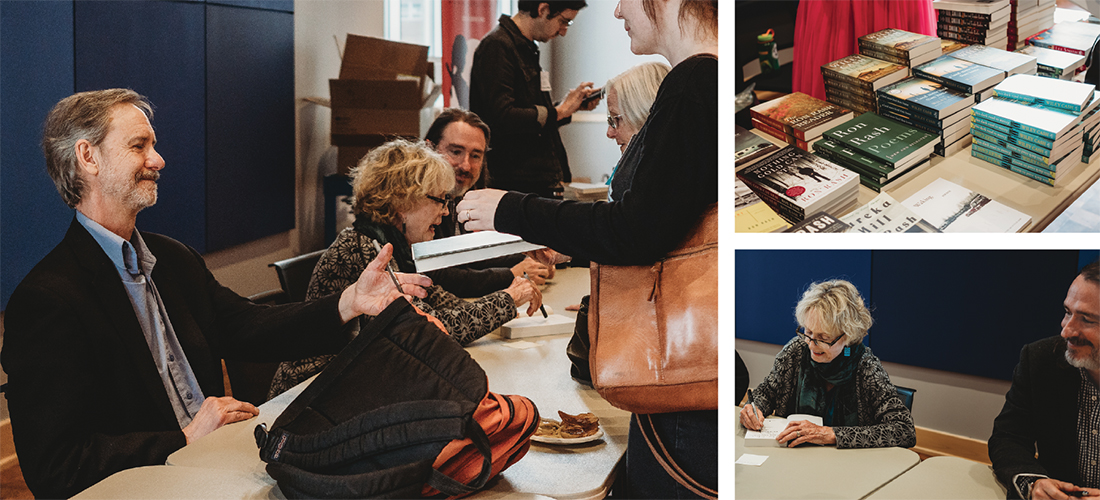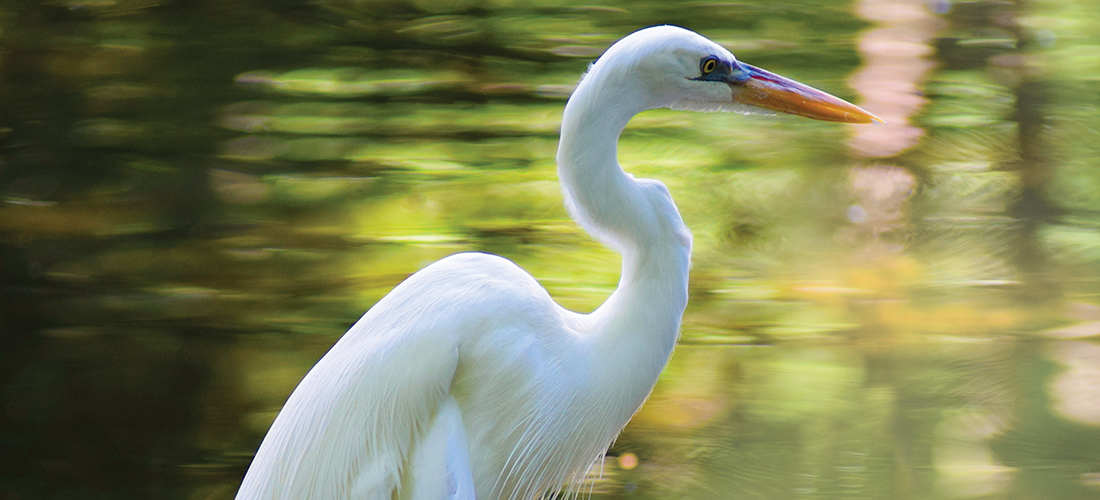The Magic of Lake Waccamaw
Smooth paddling to marriage and mayflies and an ageless friend named John
By Amy Lyon
On a recent Sunday morning, my husband Jonathan and I mounted our bicycles onto the back of our car and drove over to Lake Waccamaw, 35 miles west of Wilmington just south of Highway 74.
It’s the time of the mayfly, during which over a course of several weeks, millions of waterborne insects arise from the lake into flying adulthood. Narrow lithe things, about two inches long — half their length antennae, without mouth or stomach — they take flight and perform a courtship dance that culminates in mid-air mating. They lay their eggs on the water’s surface that sink into its depths, and then the mayfly dies — all within a 24-hour period. When we reached the lake, we were greeted by a dark swarm of them. As we unpacked our bikes, dozens landed on our heads, hair, clothes and legs. We kept our lips locked when we rode or we’d inhale a mouthful. A messy business; no one paints their house during mayfly season nor tars a driveway, else they’d mummify thousands.
Lake Waccamaw is among the most beautiful and pristine of the Carolina Bay Lakes, with a surface area of almost 9,000 acres of water that mirrors the changing sky, and a 14-mile shoreline ringed by magnolias, live oaks draped with Spanish moss, and water-resistant cypress trees and their fairy-tale knobby knees. Lake Waccamaw State Park claims about a third of its shoreline and offers visitors miles of sandy walking paths through flanks of towering long-leaf pine lit by the slant of sunlight, and by small beaches, scattered with indigenous mussel shells, unique to the lake. The park culminates at a low concrete damn at the lake’s southwest corner that separates the lake’s open, sun-lit airiness from the start of the Waccamaw River, which meanders its way through the shadowy Green Swamp until it empties into the Atlantic at Georgetown, South Carolina. The remaining waterfront is protected by prescient zoning laws which limit the height and stature of the waterfront houses. Hurricane Florence flooded the lake, damaging many of these, and restoration work is ongoing. There are no hotels, but several houses function as inns, or if you’d rather, you can camp at the park. The lake’s only restaurant, Dale’s Steak and Seafood, is open for business and on a weekend night brims over with locals. They know how to serve a hearty meal, and over the years Jonathan and I have enjoyed many.
Jonathan discovered Lake Waccamaw when he was in high school in Charlotte and his Explorer Scout Troop would drive east to paddle the Waccamaw River. It was then he fell in love with the placid water, verdant canopies and the chance to glimpse great blue herons, a flock of snowy egrets, turtles lined up as if they were unpacked Russian dolls descending in size and, of course, alligators. On his many spring canoe trips, a seed was planted that one day he’d write a story about this place. Soon after college he started his research at the Lake Waccamaw Museum and while there was told that if he really wanted to know about the lake, he needed to speak to John McNeill, a pharmacist in Whiteville. John’s face lit up at Jonathan’s request. The long-time scoutmaster told Jonathan he would meet him at his log cabin at the lake after he finished work and he should go ahead and wait for him there, the door is never locked. Thus began their long friendship.
My first visit to Lake Waccamaw was during our courtship, when Jonathan was living in Atlanta and I in Massachusetts. For years in early spring before the swamp became impenetrable with vines, snakes and mosquitoes, we’d meet at the Wilmington airport, drive to the lake, secure canoe rentals from the state park, and spend a night with John at his cabin before heading downriver. The night before we set off we’d eat a fish dinner at Dale’s as John regaled us with stories about the lake and its history, the swamp and its people, and his memorable years in the South Pacific during World War II when he commanded an LCT (Landing Craft Tank). A short man, in order to be accepted into the military, he would hang upside down, allowing the space in between his vertebrae to make up for the inch or so he needed. It worked. In between those stories, he’d catch us up on the most recent country he had visited, a lifetime tally of more than 80. Before retiring John might pull out his telescope and point out planets and on a clear night the moons of Jupiter. The next morning he’d help us get our cars and canoes and gear over to the dam, our put-in point, and with sparkling eyes and an impish smile under a thick white head of hair, wave us off, thrilled that we’d come to his beloved lake to have an adventure.
On one of those spring mornings before we headed to the dam, in the hour before sunrise with just a soft hew of light in the eastern sky, Jonathan paddled me out onto the lake and on wobbly knees in the bobbing canoe announced, “I’m tired of you being my girlfriend, I want you to become my wife.” I’m not sure who was more nervous. I had already been married once and Jonathan at 40 had never been married. On our return to shore, John was waiting at the end of his bow-shaped dock holding a foot-long piece of cypress. This piece of wood, which resembled a Scottie dog, had been dredged up from the bottom of the lake from a layer of peat that was once an ancient forest and had been a favorite of his wife’s. He wanted us to have it. John and Lake Waccamaw was in large part the reason we moved to Wilmington from Massachusetts 13 years ago.
A master horticulturist, John spent the quiet winter months plotting out his dock garden, as impressive as any landlocked one — one could argue even more so given its shimmery surroundings. Come April, he’d be out planting hundreds of seedlings timed just right so they would be in full regalia for his annual July 4th party when his 200-foot dock lined with flower boxes and containers would brim over with impatiens, marigolds, jeweled petunias, red salvia, trails of sweet potato vines, miniature eggplants on which children painted faces, and my personal favorite, a tub of four-leaf clovers, enough for everyone, not just a lucky few.
On stakes in the flower boxes were wooden portraits of all the signers of the Declaration. For the ones that we don’t know what they looked like, John used a face of a friend or relative. The Wilmington Police Pipe & Drums, dressed in kilts, led the procession down the dock, the bagpipe notes, proud and loud, quieting the crowd, followed by his children and grandchildren, each holding a flag from a different country; and if there were a visitor — say from the Philippines or Brazil — that flag would have a place of honor. For years during the afternoon break before an impressive night display of fireworks, a rabbi who had been a guest one July 4th would call from Israel to send his best wishes. The parade culminated with a recitation of the Declaration of Independence, by one or more of his grandchildren, to the dozens of boats that surrounded the dock and hundreds of us on it. After which we’d feast on hot dogs and beans and a birthday cake for America. We used to call it John’s birthday, although his actual one was in September. Two years ago, John died just after turning 98.
John loved the mayflies. He delighted in their invasion, explained the more robust their numbers, the healthier the lake’s ecosystem. Evidently this is an extremely healthy year. John would have been pleased and he’d have an easy answer for the astonished initiate who, upon experiencing this phenomenon would say, “But that’s so sad! To live only one day?” To which John would reply, “But that one day is at Lake Waccamaw, you can’t get any luckier than that.”
Amy Lyon lives and writes in downtown Wilmington.


